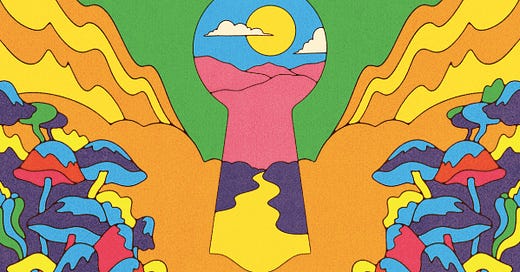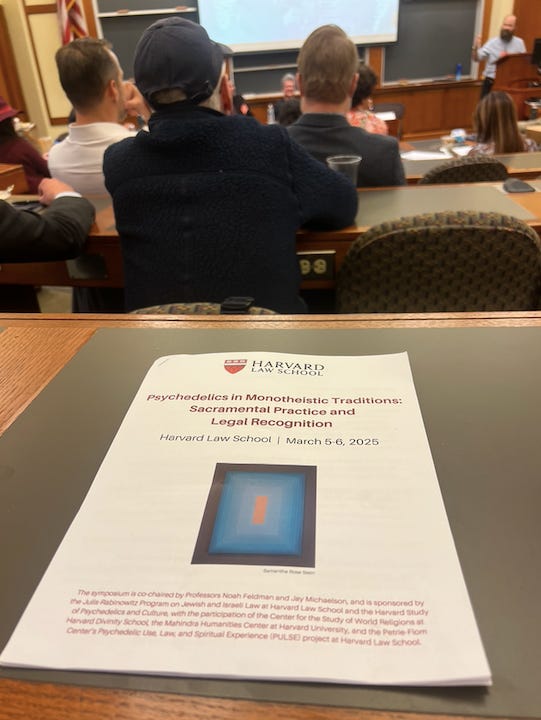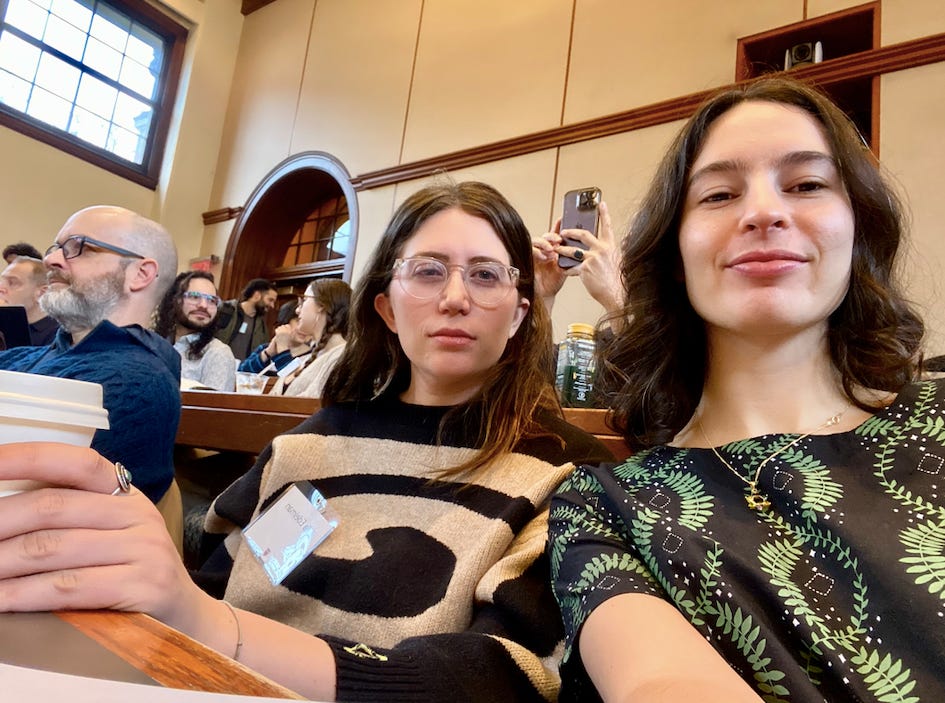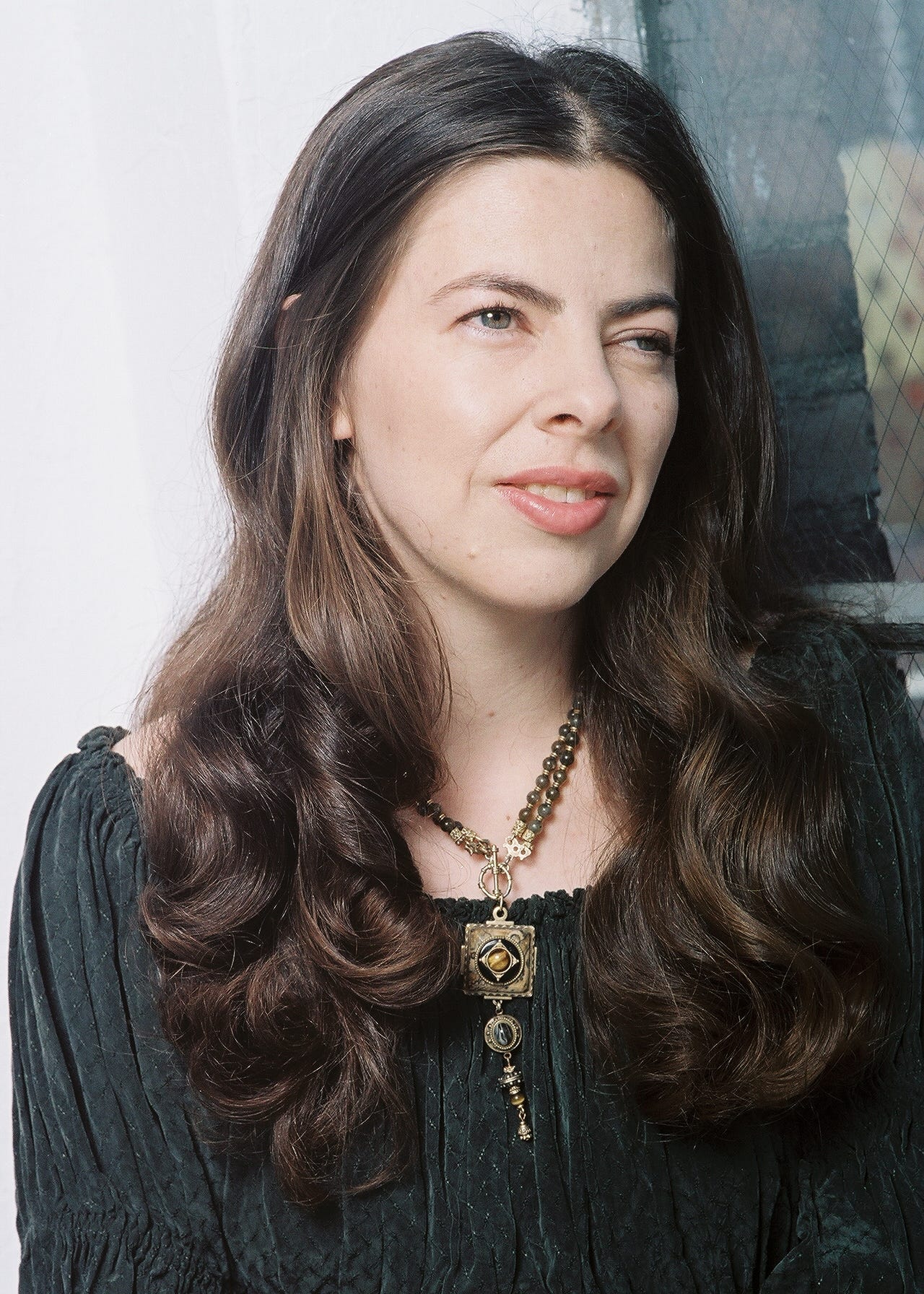A Psychedelic Trip to Harvard
On attending a Psychedelic Symposium at Harvard Law, and a conversation with author Jill Hammer!
Last week, I went to Harvard to attend a psychedelic symposium. I was invited by my friend Chloe, who works at Shefa, a wonderful Jewish psychedelic non-profit.
Over the past year, I’ve been exploring leaning into more Jewish, embodied spaces after leading a Shabbat ecstatic dance, and have gotten into writing more about psychedelics. So, when I had the chance to learn more about how psychedelics and Judaism could work together, I knew I had to go.
It was immediately fascinating to be dropped into this world. People had traveled from all over the country to be there. The symposium was titled, “Psychedelics in Monotheistic Traditions: Sacramental Practice and Legal Recognition,” and panelists spoke about how psychedelics could inform and transform their experiences with Judaism, Islam, Christianity, and Catholicism.
At one point at the end of the first day, someone asked me if I had met any interesting people so far. “Every single person here is interesting,” I responded. And it was true. All the ideas shared over the next two days really blew me away.
It also felt particularly historic to be there. Richard Alpert, later known as Ram Dass, and Timothy Leary were both faculty at Harvard University, where they conducted experiments with psychedelics, particularly psilocybin and LSD, through the Harvard Psilocybin Project, leading to their dismissal in 1963.
Now, here was the first ever symposium on psychedelics being held at Harvard, further legitimizing efforts to make psychedelics embraced through religious ritual, and less stigmatized. It was organized by Noah Feldman, a Harvard law professor and the prolific author, as well as
, a writer, journalist, professor, and rabbi. Michelson recently wrote, “The Secret That Is Not A Secret: Ten Heretical Tales,” and writes about law and psychedelics on his Substack, Both / And.Although the symposium was held at Harvard, the use of psychedelics is still, well, illegal. There is no legal recognition of such use, even in a religious capacity, which remains formally illegal under the Controlled Substances Act (except for rare religious exceptions). And yet, here in this lecture hall of 200 or so people, everyone was speaking openly about psychedelics.
I couldn’t help but feel as if I was in a version of Roald Dahl’s The Witches. In the 1983 children’s book, a young boy vacationing at a hotel in England sneaks into a ballroom where there is a convention happening, but it turns out to be a yearly gathering of witches instead. When all the witches are together, they feel comfortable unmasking themselves, taking off their wigs and letting loose.
This is a bit how the energy felt to me. None of this was expressly allowed, and yet now that all these psychonauts were together in a room together, they felt free to be themselves and speak openly.
Feldman opened the symposium by clarifying that this was not a conference, but specifically a symposium, referencing the exchange of ideas presented in ancient Greece. Typically, a symposium would occur while participants reclined on couches and drank wine while in conversation. Although we were sitting in wooden lecture hall seats, rather than lounging comfortably, and drank coffee instead of wine, the motivation was still the same. To explore these topics together with an open mind.
I was fortunate to hear from authors and speakers presenting on a vast variety of perspectives. The morning opened with the topic of “Jewish Techniques of Ecstasy, Mysticism, Magic, and Spiritual Guidance,” then moved into “Islam and Psychedelic Practice” by the afternoon, and by early evening, we discussed, “Christianity, Psychedelics, and Non-Ordinary Experiences,” with lectures such as, “Could MDMA Support Catholic Faith and Practice? A Conservative Maybe.” (You can view the full schedule and speakers here).
One of the speakers that really stood out to me was Fayzan Rab. He’s a Muslim-American, 4th year medical student, and psychedelic researcher, and spoke on “Muslim Communities’ Perceptions of Psychedelics.” It was refreshing to hear about muslim experiences with psychedelics, and his perspective on how we can bring together Eastern wisdom with Western science for the advancement of human potential and healing.
“Our work underscores one primary theme: that Muslims are using psychedelics for spiritual, recreational, and therapeutic reasons. And, in this community, we see a microcosm of the issues facing the psychedelic ecosystem today including legal representation, cultural stigma, inclusion of minority groups to make research more generalizable, reinvention of existing faith practices, and theological discussions,” Fayzan told me. “My assertion to the broader psychedelic community is that if we get it right for Muslims, we will naturally be doing the work to make it right for all minority communities looking to be included in the psychedelic renaissance.” You can learn more about his research by checking out his Ted Talk.
The symposium didn’t only focus on psychedelics, but also attaining altered states of consciousness. Rabbi and author Jill Hammer explored this in detail in her presentation, “The Drum and the Vineyard: Priestesses Changing Consciousness in Ancient Israel.” She spoke about how women with drums, acting as sacred musicians, were important figures in biblical culture, and were sometimes named as temple workers or prophetesses. These musical, earthy rituals seem to suggest that music and wine were openings to deep ritual experience and even to prophecy.
If you’ve been following my newsletter, you know how much I love drumming. I’ve even dedicated a whole newsletter to it. So, when I saw there a presentation dedicated to how women in ancient Israel used the drum, dance and song to create sacred experience and change consciousness, I couldn’t wait to speak to Jill.
Which is why I asked her to answer a few question about her work for a brief interview, which you can read below!
How did you become drawn to this topic?
I have been researching and reviving the ritual roles of Israelite and Jewish women for a long time. I’ve written about it in The Hebrew Priestess: Ancient and New Visions of Jewish Women’s Spiritual Leadership (Ben Yehuda Press, co-authored with Taya Shere) and in articles and essays. I focus much of my scholarship and writing on integrating priestess knowledge and practice into contemporary Jewish life. I do this as part of my work with Beit Kohenet and in other contexts, and I have helped to ordain contemporary Hebrew priestesses.
What is the role of the drum in Judaism and creating altered states of consciousness?
The drum can entrain groups of people in the same rhythm and can help people drop into a theta state, which is an altered state of consciousness like the one we enter when we meditate or dream, that can expand our imaginations and give us deep peace. Israelite women used drums for ritual and celebration, and Jewish women have used drums throughout the centuries. It’s said, for example, that women used drums in Spain to cheer up the Jews who were being expelled, and Turkish Jewish women were known for their drumming expertise and even hired by kings for that purpose. And today, in some Jewish ritual communities, drums enhance prayer and sacred experience.
What sensations does drumming conjure for you?
Drumming usually makes me want to dance! I feel more alive in my body when the drum is playing. And drums also help me in prayer and meditation, allowing me to focus more deeply on what’s happening in my body, heart, and soul.
How can psychedelics change how people interact with Judaism?
What I’m able to speak about is changing consciousness. Changing consciousness can be a spur to creativity. When we are in a dream state or a state of awareness that is deeper than our usual consciousness, we can see images, feel feelings and have ideas that are new, fresh, and not bound by our usual ways of thinking or the pressures on us from the outside. I find it’s also true that when we deepen out consciousness, we can access states of deep peace and healing.
Do you consider Judaism innately psychedelic?
All spiritual traditions have methods of changing consciousness. Certainly Judaism has those methods, too. Study, prayer, mystical experiences, meditation, music, and storytelling all contribute to that.
You also facilitate life-cycle and seasonal rituals. Can you speak more about that?
I see ritual as a fundamental human activity that helps us connect to a sense of the larger whole. I create rituals, drawing on traditional as well as creative sources, for Jewish holidays, seasonal moments, and lifecycle events. My rituals often contain music and chant, story, meditation, connection to the natural world, and/or sensory experiences that help bring us into the present.
How can we integrate what we learn from these psychedelic practices into our daily life to feel more connected to ourselves and nature around us?
When we enter a deeper state of consciousness, we may feel greater mystery and magic in the world, and we may also feel more connected to the cosmos of which we are a part. These experiences can infuse our daily lives with meaning even in so-called ordinary moments. It just requires pausing to tap into our aliveness, our connection to one another and the world around us, and our awareness of the present.
By the end of the symposium, I was floored by all the ideas that had been presented, and energized by this desire to see psychedelics, ritual, religion and consciousness in this new way. Ram dass said, “Every religion is the product of the conceptual mind attempting to describe the mystery.”
Now, hopefully, psychedelics and altered states of consciousness could be used in tandem to describe the mystery even further.
In the comments…
Do you think psychedelics can be used to embrace your connection with religion?
If not, do you think the two should be practiced separately?
What rituals do you have that help you alter consciousness, or feel a deeper spiritual connection?














